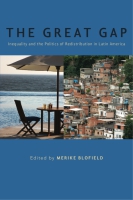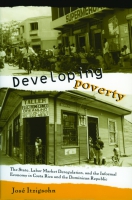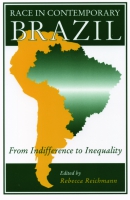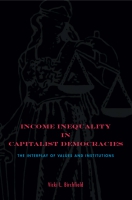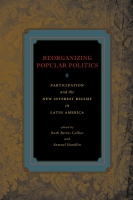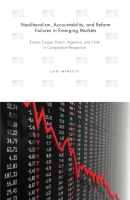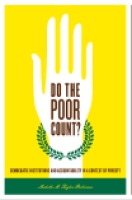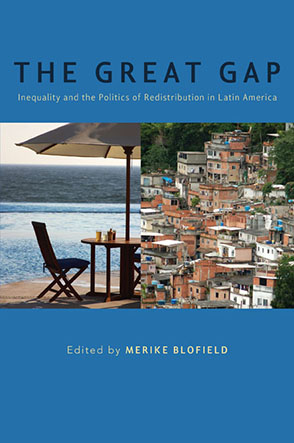
The Great Gap
Inequality and the Politics of Redistribution in Latin America
Edited by Merike Blofield
The Great Gap
Inequality and the Politics of Redistribution in Latin America
Edited by Merike Blofield
“I find The Great Gap to be the best and most important contribution to the study of Latin America written for quite some time.”
- Description
- Reviews
- Bio
- Table of Contents
- Sample Chapters
- Subjects
Aside from the editor, the contributors are Pablo Alegre, Maurício Bugarin, Daniela Campello, Anna Crespo, Francisco H. G. Ferreira, Fernando Filgueira, Liesl Haas, Sallie Hughes, Juan Pablo Luna, James E. Mahon Jr., Juliana Martínez Franzoni, Adriana Cuoco Portugal, Paola Prado, Elisa P. Reis, Luis Reygadas, Sergio Naruhiko Sakurai, and Koen Voorend.
“I find The Great Gap to be the best and most important contribution to the study of Latin America written for quite some time.”
“Inequality encompasses diverse aspects of social, political, and territorial relations that commonly elude even learned discussions and debates. The Great Gap sets a high standard for Latin Americanists as well as comparativists in terms of both the breadth and depth of its analyses of this fundamental issue.”
“Social scientists have long assumed that political democracy will reduce social and economic inequalities. Thus, they have been puzzled by the persistence of extreme inequalities under democratic regimes in Latin America. Merike Blofield and her co-authors shed new light on this question by exploring how inequalities shape group interests, political power, and democratic processes, often in ways that reproduce those very inequalities. This provocative and insightful text breaks new ground in the study of the political economy of inequality, in Latin America and beyond.”
“Blofield’s volume is itself a wake-up call that democracy is only as strong as the level of equality it can help to produce.”
“In The Great Gap: Inequality and the Politics of Redistribution in Latin America, University of Miami political scientist Merike Blofield assembles a distinguished group of social scientists to look at why democracies tolerate high inequality. Blofield concludes that a ‘window of opportunity’ may be opening for more redistributive policies as populist regimes in Venezuela and Bolivia offer a wake-up call to the region’s elite about the perils of not acting. This may help persuade the middle and upper classes to invest in a new social contract where more public expenditures target the ‘unincorporated’ poor. . . . Blofield’s volume is itself a wake-up call that democracy is only as strong as the level of equality it can help to produce.”
“Blofield’s outstanding volume is a major contribution to our understanding of the relationship between inequality and politics. In addition to showing how inequality is reproduced, it persuasively demonstrates how pervasive inequality is in Latin America, how elites, the media, and the public perceive inequality, and how inequality affects taxation and social policies. . . . [It] deserve[s] a wide audience, and not only among Latin Americanists.”
“Interdisciplinary attempts to understand the increasingly complex relationships between continuing inequality and politics in Latin America are somewhat thin on the ground. Merike Blofield's excellent edited volume, prepared under the aegis of the Observatory on Inequality in Latin America at the University of Miami, represents a welcome contribution in this regard.”
Merike Blofield is Associate Professor of Political Science at the University of Miami.
Contents
Preface and Acknowledgments
Introduction: In equality and Politics in Latin America
Merike Blofield
Part 1: The Socioeconomic Context
Chapter 1 | Fault Lines in Latin American Social Development and Welfare Regime Challenges
Fernando Filgueira
Chapter 2 | Inequality of Opportunity in Latin America: Economic Well- Being, Education, and Health
Anna Crespo and Francisco H. G. Ferreira
Part 2: Elite Culture, Framing, and Public Opinion
Chapter 3 | Elite Perceptions of Poverty and Inequality in Brazil
Elisa P. Reis
Chapter 4 | Media Diversity and Social Inequality in Latin America
Sallie Hughes and Paola Prado
Chapter 5 | Public Opinion on Income Inequalities in Latin America
Merike Blofield and Juan Pablo Luna
Part 3: Agenda Setting and the Politics of Inequality
Chapter 6 | The Politics of Redistribution in Less Developed Democracies: Evidence from Brazil, Ecuador, and Venezuela
Daniela Campello
Chapter 7 | Inequality and the Cost of Electoral Campaigns
Maurício Bugarin, Adriana Cuoco Portugal, and Sergio Naruhiko Sakurai
Chapter 8 | Shallow States, Deep Inequalities, and the Limits of Conservative Modernization: The Politics and Policies of Incorporation in Latin America
Fernando Filgueira, Luis Reygadas, Juan Pablo Luna, and Pablo Alegre
Chapter 9 | Gender Equality Policies in Latin America
Merike Blofield and Liesl Haas
Part 4: Taxation and Social Policies
Chapter 10 | Tax Reforms and Income Distribution in Latin America
James E. Mahon Jr.
Chapter 11 | Are Coalitions Equally Important for Redistribution in Latin America? The Intervening Role of Welfare Regimes
Juliana Martínez Franzoni and Koen Voorend
Conclusion: Inequality and the Politics of Redistribution
Merike Blofield
Contributors
Index
Introduction
Inequality and Politics in Latin America
Merike Blofield
The relationship between socioeconomic inequality and democratic politics has been one of the central questions in the social sciences from Aristotle on. Recent waves of democratization, combined with deepened global inequalities, have made understanding this relationship ever more crucial. Indeed, we can see a current surge of interest in the relationship between inequality and democracy, as indicated by the Fall 2009 issue of PS: Political Science and Politics, which published a symposium, “Inequality and Politics in Developing Countries,” edited by John Echeverri-Gent and with contributions from leading scholars, and by Nancy Bermeo’s thoughtful piece titled “Does Electoral Democracy Boost Economic Equality?” in the October 2009 issue of the Journal of Democracy. A general conclusion of both of these sources is that we do not have many generalizable theories about the relationship between the two, partly because reality is very complex, and partly because of lack of systematic research on the issue.
This book seeks to remedy this dearth of theories and to contribute to understanding this relationship by providing an interdisciplinary but systematic and theoretically tied analysis of inequality and politics. We focus on the region with the highest socioeconomic inequalities in the world, combined with more than twenty years of formal democratic politics: Latin America. In this sense, we engage in midlevel theorizing, and we hope that scholars studying other regions of the world are inspired to review our findings and examine whether and how they may apply to the rest of the world.
Latin America has now experienced more than twenty years of elected democratic governments (with, of course, the prominent exception of Cuba). The region is rich in natural resources, and the United Nations classifies most of its countries as “middle-income.” Nonetheless, tremendous socioeconomic inequalities have relegated a significant sector of the population to economic and social deprivation, with 189 million people living in poverty in 2009 (CEPAL 2009). Latin America has the highest inequalities of any region in the world. Although most countries in the region recorded some improvements in income distribution during the first decade of the twenty-first century (López-Calva and Lustig 2010), these inequalities remain extremely high (CEPAL 2009).
Deep socioeconomic inequalities have been an entrenched characteristic of Latin American countries since colonization. What is striking is that they have persisted despite more than two decades of formal democratic politics. On a very basic level, we would expect that if democratic politics are superimposed on highly unequal societies, the majority would vote for and demand redistribution, and policies would follow (Meltzer and Richard 1981). This has mostly not happened, partly, no doubt, because of the dramatic concurrent socioeconomic and technological changes the region has undergone in the past twenty years that have affected inequalities. Clearly, democratic elections on their own have not reduced inequalities, and the relationship between socioeconomic inequality and democratic politics is much more complex (Boix 2003). Why have elected governments not done more to reduce these inequalities? What are the mechanisms by which the inequalities themselves may affect the political process? These are the central questions this book seeks to answer.
There is a growing normative recognition among international organizations and policy makers that inequality has hindered democratic consolidation and the quality of democracy in Latin America (UNDP 1995, 2004; ECLAC 2000; Ferranti et al. 2004; Márquez et al. 2008). The United Nations Summit on Social Development (UNDP 1995) forged a worldwide consensus among political leaders on poverty, unemployment, and social exclusion as primary concerns for policy makers. It committed governments, among other things, to “[p]romote the equitable distribution of income and greater access to resources through equity and equality of opportunity for all.” A follow-up report by the Economic Commission for Latin America, aptly titled The Equity Gap, found “glaring shortcomings” in the region’s efforts to combat unemployment, poverty, and social exclusion (ECLAC 2000, 9) and identified socioeconomic inequality as one of the key barriers. The Report on Democracy in Latin America of the United Nations Development Programme identified “inequality and poverty as [democracy’s] main weaknesses” (UNDP 2004). In addition, both the World Bank and the Inter-American Development Bank have published important reports on inequality and social exclusion that recognize their negative impact on economic development and democratic politics (Ferranti et al. 2004; Márquez et al. 2008).
What are the effects of these inequalities? On the most basic level, they reduce the standard of living and quality of life of the poor and prevent them from achieving their full human potential. More broadly, they also prevent them from interacting with those around them in conditions of basic dignity and from actively participating in democratic politics. A growing body of recent scholarly articles has analyzed the effects of high inequalities and class divisions on social participation, the quality of democracy, and democratic governance (Bellone Hite and Viterna 2005; Benhabib and Przeworski 2006; Huber, Pribble, and Stephens 2008; Huber 2009; Karl 2000; Kaufman 2009; Korzeniewicz and Smith 2000; Kurtz 2004; Portes and Hoffman 2003; Przeworski and Meseguer 2005; Roberts 2002; Weyland 2004).
Several edited volumes have also addressed the high levels of inequality in Latin America (Chalmers et al. 1997; Tokman and O’Donnell 1998; Gottschalk and Justino 2006). These books are extremely useful contributions, but they remain quite broad in scope and tend to be more descriptive (with the partial exception of the 2006 volume). The publication of López-Calva and Lustig’s edited volume (2010) titled Declining Inequality in Latin America: A Decade of Progress? promises to add to the debate. Its contributors analyze the determinants of a moderate decline in inequality between 2000 and 2007 in the region, with case studies of four countries. Although the volume analyzes inequality as a dependent variable, the introduction by López-Calva and Lustig and Robinson’s chapter in the volume also discuss the political implications of high inequalities.
Finally, two single-author books have also addressed inequality more directly. Daniel Brinks’s book on inequality, the rule of law, and police violence (2008) examines the relationship between socioeconomic and legal inequality and the crucial mediating role of political factors in it. Carles Boix’s book Democracy and Redistribution (2003) provides a compelling frame for thinking about how inequality affects demands for income redistribution, and how capital mobility affects that relationship (and which chapter 6 in this volume takes to task). In general, more books have begun to analyze the links between the socioeconomic context and the political process, even if they have not addressed socioeconomic inequality directly.
Despite these contributions and the growing recognition of the importance of inequality for politics, as evidenced by the PS: Political Science and Politics 2009 symposium, there is still a dearth of systematic, comparative research on whether and how socioeconomic inequalities in the region are filtered through elite culture, public opinion, and framing; how they influence agenda setting and representation; and how they affect public policies. This book seeks to provide a framework with which to examine these different facets of the relationship between inequality and politics, drawing on specialists from political science, sociology, economics, and communications.
In this book, we take socioeconomic inequality—understood as the distribution of income and resources, as well as class structures and status hierarchies—as a causal or independent factor that may shape political processes and outcomes. We examine whether and how socioeconomic inequality affects politics and policy options in concrete ways. In the process, we address two broad questions: whether and how socioeconomic inequalities maintain themselves through (or despite) democratic politics, and whether and how such inequalities may, over time, foster political constraints or create opportunities in the form of political coalitions to address those inequalities.
In doing so, we pay special attention to the impact of inequality on political processes regarding redistribution. We ask the following questions: How does inequality shape the relative power of elites and dominant social classes, on the one hand, and the interests of those elites and classes, on the other? How does inequality shape the power and interests of subaltern classes and groups? Are there mechanisms in highly unequal societies that constrain the political system from addressing and alleviating those inequalities even in the context of formal democratic politics? If so, how do these causal mechanisms operate?
With this focus and these questions, we seek to address inequality as the deep-seated problem that it is in the region, and also to take into account the new contingencies—specifically, the political shift to the left in many countries—that have developed in the region during the past five to ten years.
In addition to the introduction and conclusion, there are eleven substantive chapters in this volume, divided into four parts. Part 1 contains two chapters that discuss the socioeconomic context, outlining, first, the historical and sociodemographic changes, and second, the inequality of opportunities in the region. Part 2 addresses elite culture, public opinion, and media framing with the broad question: how does inequality affect social perceptions and framing on inequality and redistribution? Part 3 addresses agenda setting and the politics of inequality by looking at capital mobility, campaign financing, and political representation, as well as a case study of a concrete policy area: gender equality policies. It asks the broad question: how does unequal access to resources influence political agendas on inequality and redistribution? Part 4 examines taxation and social policies with the question: how do extant inequalities affect public policies on redistribution? The conclusion brings together the main findings of the chapters and discusses both theoretical and policy implications.
Mailing List
Subscribe to our mailing list and be notified about new titles, journals and catalogs.
